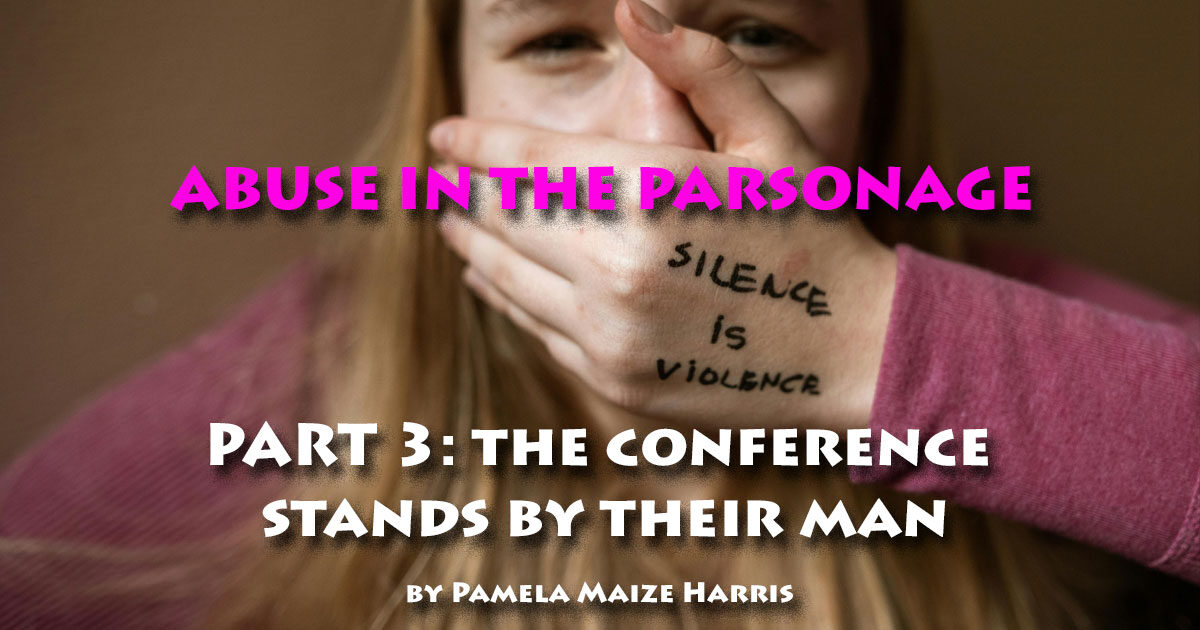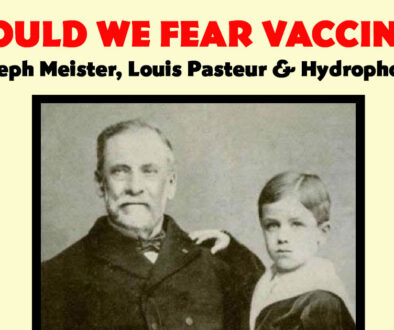Abuse in the Parsonage, Part 3: The Conference Stands by Their Man
by Pamela Maize Harris | 11 April 2025 |
This is a true story about domestic violence committed by a pastor in an Adventist clergy home. The names have been changed to protect the identity of those involved. You can read the first part of Sylvia’s story here, and the second part here.
Just after Easter, and after Sylvia had spent a month in a shelter for battered women, Sam left town. So Sylvia returned to the parsonage briefly.
She invited the church elders and their spouses, where she described in detail Sam’s domestic violence, and told them she would be leaving. One church member chastised Sylvia for contacting the police—and asked her why she was leaving if she wanted the marriage to work. No one stopped Sam from continuing to preach—and hasn’t to this day.
When Sylvia contacted Sam’s conference, she was told that the conference president would contact her. When she didn’t hear from him, Sylvia called him directly. She told him about the horrific abuse she’d endured at the hands of her pastor husband.
The president abruptly stated, “We don’t get involved in domestic disputes.” A few weeks later, Sam was given a prominent preaching assignment at camp meeting.
The same president spoke at a nearby church that Sylvia’s aunt attended. Sylvia’s aunt asked what the conference was doing about the case. The conference president replied that Sam had merely “roughed Sylvia up.” It appeared that he didn’t think it a serious problem.
Eventually Sylvia sent the conference a full package of information: case numbers, notice of arrest, copious documentation of the abuses, a letter from the domestic violence shelter verifying her month’s stay, and photos of her bruises.
Sam’s verdict
Police attempted to contact Sam while Sylvia was in the battered women’s shelter. He wouldn’t answer the door. Sylvia’s case was forwarded to the state’s attorney’s office. Upon review, Sam was charged for simple assault domestic violence, a high-level misdemeanor. “Once he is arrested, we will proceed with prosecution in this matter,” the state’s attorney’s office wrote.
Eventually Sam was arrested with probable cause, and posted bail. Upon release, Sam told both his churches from the pulpits that he was innocent—and described Sylvia as crazy.
Did the conference hire an attorney, or did Sam? Either way, in the end the state agreed to defer Sam’s prosecution.
Legal negotiations began with a required apology letter to Sylvia. No, his attorney argued, “That would admit guilt.” Instead, his attorney submitted a list of rather “low bar” stipulations for deferred prosecution. Sam would not get in trouble for a year; evaluation for substance abuse; an online counseling with a pastoral counseling service in Kettering, Ohio; letting Sylvia have her belongings but otherwise not being in contact with her or making any reference to her; anger management classes; and self-reporting his progress.
If Sam successfully completed these requirements, “The state shall then file an Amended Notice of Dismissal” with prejudice as to the charge of simple assault domestic violence.…”
In other words, after a year, it would be like it never happened.
Sam as a minister
Through all this, the conference refused to contact Sylvia. During this time, though, they assigned Sam to serve to their highest board, the Conference Executive Committee—a sign of respect and recognition in church work.
Then a new conference president took over. Surely this one would do something! Sylvia contacted him, congratulated him on his new role, and begged to know what was being done. Again, no response.
Frustrated, she reached out to the union conference president, explaining the situation: a pastor who was a violent abuser, and was known to have sexual dalliances. Surely these were violations of both law and church policy that should be addressed! The union conference president agreed. The next day Sam’s conference president, likely under pressure from the union conference office, finally replied to her correspondence. It had been over a year since her first request! The Church Manual says,
“Care for the disciplinary process with a reasonable time and then communicate its decisions with kindness and promptness. Delay in administering discipline may increase the frustration and suffering of the member[s] and the church itself.” p. 70
Sylvia requested “as a professional and moral courtesy”:
- To be heard in person by the disciplinary committee and Executive Committee
- To receive an apology from the conference for its part in enabling Sam to malign her character for a year, and to clear her name in the conference
- To see Sam disciplined by the conference for his crimes so he would be forced to seek help
Heard at last
Three days later, the conference president wrote her:
“We have been in regular consultation with our legal counsel from the North American Division as well as Adventist Risk Management pertaining to your allegations you made against Sam…. We wanted to make sure we follow the correct procedures so that both you and Sam are treated fairly.”
He added, “…We have received counsel from Adventist Risk Management on how best to proceed with this matter in a non-partisan manner.” Here’s the process they outlined:
- The Conference Executive Committee creates a special committee of three new administrators and three lay members, including two women.
- The special committee reviews both her submitted material and Sam’s accounts of the allegations.
- After studying both accounts, the special committee makes a recommendation to the Conference Executive Committee.
Sylvia would be given 45 minutes with the sub-committee, then Sam would have 45 minutes. Members could ask clarifying questions. The subcommittee would then make a recommendation to the Conference Executive Committee.
Again, Sylvia prepared a packet that included documents, photos, police reports, letters from domestic abuse shelters, texts, and other material and flew to the conference office, where she presented the full documentation to the subcommittee. “I know people on that committee believed me,” she says. “In the hallway, the president hugged me and promised he would take action. Some of the committee had listened to the audio of the abuse. They encouraged me to get a divorce, and one called Sam an abuser. They warned I should not be further groomed for abuse.”
A shocking response
About five weeks later, Sylvia received a letter. It said that by “unanimous vote” the Conference Executive Committee voted to keep Sam as a pastor because, he was “eligible for employment.”
It’s important to note that the Executive Committee, which was tasked with making the final decision, didn’t meet with Sylvia. The Executive Committee’s vote was made at the word of the smaller committee’s spokesman. “Eligible” remained undefined. Legally? Morally? Biblically? According to policy? Was the recommendation influenced by what had been said earlier: “We don’t get involved in domestic disputes,” and that all he did was “rough her up” a little?
The conference president’s letter said,
“…The local administration views abuse in any form seriously and intends to give this matter due diligence…although the process may not have proceeded as quickly as any of us may have desired.”
Sylvia responded to the conference decision:
“According to the Adventist Church Manual, these [actions—that is, domestic violence] remain fire-able offenses. Why have you not fired Sam or even placed him on administrative leave? Why are these not offenses in the conference? [Further], “you allow Sam free access to vulnerable persons in the community and to unsuspecting minors—even while knowing” [his violence].”
She closed her letter,
“In conclusion, I was beaten like an animal by your employee, an ordained pastor of the Gospel, in your parsonage. If I were a church janitor making the same claim, it would have been taken seriously. But, because it’s spousal abuse, it is not punished. How can the conference entrust such a man to preach the Love of God?”
The conference president replied:
“[The committee] had one objective: to ascertain whether Sam could retain employment eligibility by the conference after allegations were made by you regarding spousal abuse…. After your testimony, the committee determined your rendition of the allegations to be factually unproven… We acknowledge that the outcome of this process may not have been what you desired; however, the matter has been thoroughly investigated and is now closed.”
He then wrote “…We can no longer entertain any further communication with you.”
It’s left to the conference
“The NAD (North American Division) general counsel and the union conference president were exceedingly kind to me,” says Sylvia. But the decision was left to the conference alone. Apparently, says Sylvia, “whatever happens in our system hierarchy will be the way of the bully pulpit or influence, not actual power over the conference.” Sylvia believes that victims who might injure the reputation of the corporate institution must be silenced. “I have been silenced while Sam retains free access to speak and fellowship—even to affect the decisions of conference leadership.” (Sam remains a member of that conference’s executive committee.)
Robert H. Burrow, the NAD general counsel, wrote to Sylvia in an email that neither he nor the union president could explain the conference’s outcome because neither were present, neither participated in the process, nor heard all the evidence presented. “I would direct you to seek such insights from the Conference leadership,” he wrote. That turned out to be impossible, because the conference president had told Sylvia, “…We can no longer entertain any further communication with you.”
With no legal record in the database of Sam’s domestic abuse by the state, Sam was “eligible to hire.” And hire him they did. A year after being charged, Sam’s charges were dropped—just like that, with no record of Sam’s domestic violence offense. It was, indeed, as though nothing had ever happened.
So Sam preached last Sabbath in the church next to the very parsonage where the abuse happened.
Epilogue
“I made oatmeal patties one Friday night,” wrote Sylvia to me.”Those patties were thrown on a freshly mopped floor for Sabbath. Metaphorically, those patties are still on the floor. I won’t be relegated to saying I was lying or that I am some brand of crazy. Nor will I believe I deserved the abuse. These brutalities happened within an Adventist home. Our church must wake up to the reality that abuse occurs in our congregations—and our parsonages. Had I been a church janitor, the conference would have dealt with this. But because I am a wife, they would not hear me, because “we don’t get involved in domestic affairs.” They chose to enable their employee, and to let Sam defame and slander me in their pulpits—which is just a continuation of the abuse.”
When church leaders cover for their employees and their members, they make themselves complicit. Jesus never tolerated or supported systemic abuse by church systems. He never propped up religious structures that hurt or maligned the powerless or the voiceless. By contrast, Jesus brought healing to the hurt and confronted sicknesses at its source. He provided a voice to the voiceless, and power to the powerless.
 Pamela Maize Harris is retired from teaching journalism at Southern Adventist University. She writes investigative reports for Adventist Today.
Pamela Maize Harris is retired from teaching journalism at Southern Adventist University. She writes investigative reports for Adventist Today.




